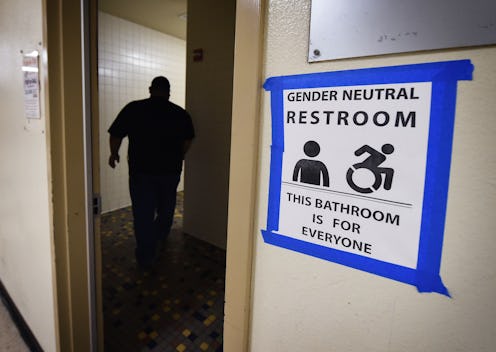Life
Kickstarter Campaign Aims To Change Bathroom Signs
2016 has been a bad year for transgender people who just want to use the bathroom in peace, with North Carolina becoming the latest state to pass a "bathroom bill," a piece of legislation aimed at keeping transgender women out of public restrooms. But one group of scrappy gender rebels would like to make a difference, and they aren't making it in the courts or on the streets — activist group the Degenderettes are taking it directly to the bathroom stall, by creating a Kickstarter campaign to fund the creation of tamper-proof stickers that designate a bathroom as an all-gender restroom.
The project to produce these stickers — which can be placed over signs that indicate gender-designated bathrooms, making them open to all genders — was funded within hours of launch, and now the organization has its sights set on a number of stretch goals, including Braille stickers and accessible stall designation signs. The Degenderettes will be reshaping bathroom doors all over the country, and the world, and the success of their project illustrates why the internet is such a useful tool for practical political action.
Across the United States, most restrooms — even single occupancy varieties — are gendered. That's the basis for the transphobic bathroom bills that insist on segregating restroom access by sex assigned at birth, as in North Carolina, where the gender marker on someone's birth certificate is supposed to determine which bathroom she uses. These bills are transparently aimed at transgender women in particular — all of the rhetoric surrounding bathroom panic involves "men in dresses" and the idea that transgender women are "predators" after women and girls. The effect of such bills is a reinforcement of transmisogyny, a particularly ugly kind of transphobia aimed at transgender women and girls.
Proponents of the "bathroom bills," of course, heatedly insist that arbitrary restrictions on bathroom access will prevent "confusion" and protect people from predators. However, discriminatory bills don't actually prevent bathroom sexual assault and harassment (in fact, as we've seen, the rate of harassment in bathrooms has actually been increasing, as people have appointed themselves Gender Judges).
Research has shown that precisely zero recorded bathroom incidents have involved transgender people sexually assaulting, molesting, or otherwise harassing people. Conversely, however, 70 percent of transgender people report that they have been sexually or physically assaulted, harassed, or interfered with in bathrooms. If anyone needs protection in public potties, it's trans people, who use bathrooms for pretty much the same things everyone else does.
Bathroom segregation also hurts transgender and gender nonconforming people who don't identify as male or female. They have to pick whichever bathroom is most comfortable for them, balancing their own relationship to gender with the risk of threats to personal safety. Scout Tran-Caffee, a Degenderettes organizer, notes that she struggles when she uses public restrooms, fearing harassment and assault in men's rooms or outraged women in women's rooms.
For some members of the trans community, using a public restroom is just too dangerous, and, as the Degenderettes put it, gendered restrooms are "killing those of us who fall through the cracks." If you can't pee in safety, you're faced with choices like staying home, risking recurrent urinary tract infections from being unable to urinate when you need to, or taking your life into your hands every time you duck into a bathroom to take care of business.
That's what the Degenderettes want to take on, with a campaign to do what society should have been doing all along: Turn bathrooms into a gender-neutral zone, something California's Assembly has already proposed, in what could become a statewide bathroom modification project and hopefully a model for the rest of the country.
Obviously the benefits to transgender and gender nonconforming people are huge here, as they should be able to use any and all bathrooms without fear of reprisals. It's also good news for cis people, though. Among other things, how many cis women have spent time in long bathroom lines, stuck with restrictive gendered bathrooms while the men's room remains wide open? Doesn't it make sense to forget about arbitrary bathroom labels, and use whichever bathroom is open?
